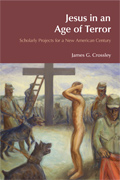Product desciption
Jesus In An Age Of Terror James G Crossley by James G. Crossley 9781845534295, 9781845534301, 1845534298, 1845534301 instant download after payment.
This book applies the work of Noam Chomsky, Edward Herman, Edward Said and several others on international politics and the supportive role of the media, intellectuals and academics to contemporary Christian origins and New Testament scholarship. Part One looks at the ways in which New Testament and Christian origins scholarship has historically been influenced by its political and social settings over the past hundred years or so. Moving on to the present, the following chapter then applies Herman and Chomsky’s propaganda model of manufacturing consent in the mass media to the recent explosion of biblical scholars writing on the internet, in particularly ‘biblio-bloggers’. It is clear that political views in ‘biblio-blogging’ conform strikingly to the emphases that come through in Herman and Chomsky’s analysis of the mass media and intellectuals, particularly with the standard lines on the ‘war on terror’ and views on the contemporary Middle East. The rest of the book takes up modified key areas of the propaganda model in more detail.
Part Two looks at the Orientalist rhetoric of clashing civilisations and how this relates to the ‘war on terror’ and the creation of Islam, Arabs, Middle East etc. as the Great Enemy in the media and relevant intellectual thought since the 1970s and, to use Derek Gregory’s phrase, ‘hideously emboldened’ in the ‘war on terror’. The next chapter then shows how this context has had a highly noticeable impact on the use of social sciences in New Testament and Christian origins scholarship, in particular the stark generalisations of scholars using cultural/social anthropology based on contemporary studies of ‘the Middle East’. Disturbingly, some of this scholarship has many rhetorical links with Anglo-American foreign policy interests in the Middle East and beyond, making some politically charged statements that cohere closely with recent intellectual defences of actions in Iraq, Palestine and beyond.
Part Three looks at issues of Palestine and Israel in the media alongside Christian, secular and relevant intellectual thought since the ‘Six Day War’ of 1967, focusing in particular on the dramatic shift towards widespread support for Israel. This also includes an analysis of the recent and controversial case of Nadia Abu el-Haj’s tenure at Barnard. The following chapter shows how this interest in Israel has had a profound impact on historical Jesus and Christian origins studies, particularly the strange emphasis on ‘Jewishness’ and misplaced allegations of ‘antisemitism’ since the 1970s. Despite the shift in support of Israel this is rarely done for love of Jews, Judaism, Israel or Israelis because there remains a notable cultural, political and religious superiority in Anglo-American scholarship. While owing much also to an Orientalist tradition, this too is strongly echoed in scholarship of Christian origins where, for all the emphasis on the ‘Jewishness’ of Jesus and the first Christians, it is extremely common to find Jesus or the first Christians being ‘better than’ Judaism or overriding key symbols of Judaism as constructed by scholarship, done, ironically, by frequent ignoring of relevant Jewish texts. The end results of contemporary scholarship are not dramatically different from the results of the anti-Jewish and antisemitic scholarship of much of the twentieth century.


